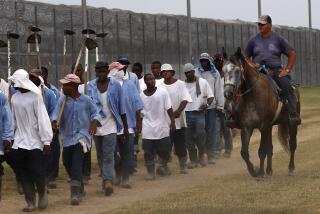Booking the Penthouse From the Big House
- Share via
About a dozen women at Travel Wholesalers International answer phones, talk to clients about their travel plans and enter plane reservations on their computers.
When the workday is done, the employees go back to their cells. They are inmates at Leath Correctional Institution, a maximum-security women’s prison in Greenwood, S.C.
“This was just something we picked because it was a neat thing that . . . and it could be profitable,” said Dan Bohan, who with his wife, Gloria, owns the Fairfax, Va.-based travel wholesaler.
The Bohans also own Omega World Travel, with 900 employees and offices nationwide, and a school for travel agents. Their wholesale company, Travel Wholesale International, subcontracts many kinds of work, including reservation services, for travel agencies. With prison wages only a fraction of the wages on the outside--and no benefits--the company can save money by using prison labor.
But Bohan says he didn’t set out to save money. He says he got the idea after hearing about how many ex-convicts end up back in prison because they don’t learn marketable skills.
“We guarantee them jobs with our company when they get out,” he said. “The only jobs they can typically get is flipping hamburgers. We feel we’ve really put them into the work force.”
Other companies also use prison employees: Trans World Airline, for instance, operates a reservation center inside a prison for young men in Ventura. However, the Bohans program is different because the prisoners don’t have access to personal information such as credit cards or home addresses.
The women only answer calls from large corporate accounts that have consented to be part of the program (in exchange for cost savings), and all their information is on file in an outside system that the inmates can’t access.
Workers outside the prison print and mail the tickets, and the inmates don’t even have pens or pencils, so if a caller inadvertently gives them sensitive information, they can’t write it down.
There are no such restrictions at TWA, which says since it has had only one breach of security, in which a credit card number was stolen, in the 12 years it’s been using prison labor.
Both the TWA and Bohan’s project, as well as other corporate uses of prison labor, worry the AFL-CIO.
“In many cases, hiring prisoners is a way of avoiding minimum wages, fair labor standards and labor compensation,” said Greg Woodhead, an economist at the union’s Washington office.
Bohan pays the prison system $3 an hour per inmate. The prisoners are paid 50 cents an hour when they start and $1.50 after 320 hours of experience. The rest of the money goes for administrative expenses, said John Barkley, spokesman for the South Carolina Department of Corrections.
In addition, the inmates’ children are offered occasional free flights to visit their mothers in Greenwood.
Minimum wage is $5.15 an hour, and a typical travel agent’s salary is in the mid-$10,000 range in rural South Carolina, Bohan said. In large cities, agents make about $30,000 annually.
Still, Bohan said his company will not make money the first two years. For now, those agreeing to use the inmates won’t have to pay reservation fees for booking airline tickets, which can range from about $10 to $20. In addition, Bohan’s company is paying for two on-site supervisors, security guards and carpeting for the computer room.
The chosen inmates had to pass tests in reading comprehension, math and geography to be considered, then make it through an interview that included such questions as how they would feel about helping someone else make plans for a dream vacation, knowing that they were staying behind bars.
The successful candidates were trained for four months on skills as diverse as data entry and telephone chitchat.
The women were told to talk about current events and steer clear of talk about their prison experiences.
“We don’t really want them to talk about that because it could lead to long conversations,” and hurt efficiency, Bohan said.
The women recently wrote their final exams to qualify as travel agents. All passed. They started working for Bohan in November.
If the South Carolina project goes well--and Bohan hopes to expand his work force there to 50 women, he plans to take the concept to Arizona. Within two or three years, he hopes to have 10 prisons with about 40 or 50 inmates in each institution in the program.
More to Read
Sign up for The Wild
We’ll help you find the best places to hike, bike and run, as well as the perfect silent spots for meditation and yoga.
You may occasionally receive promotional content from the Los Angeles Times.






